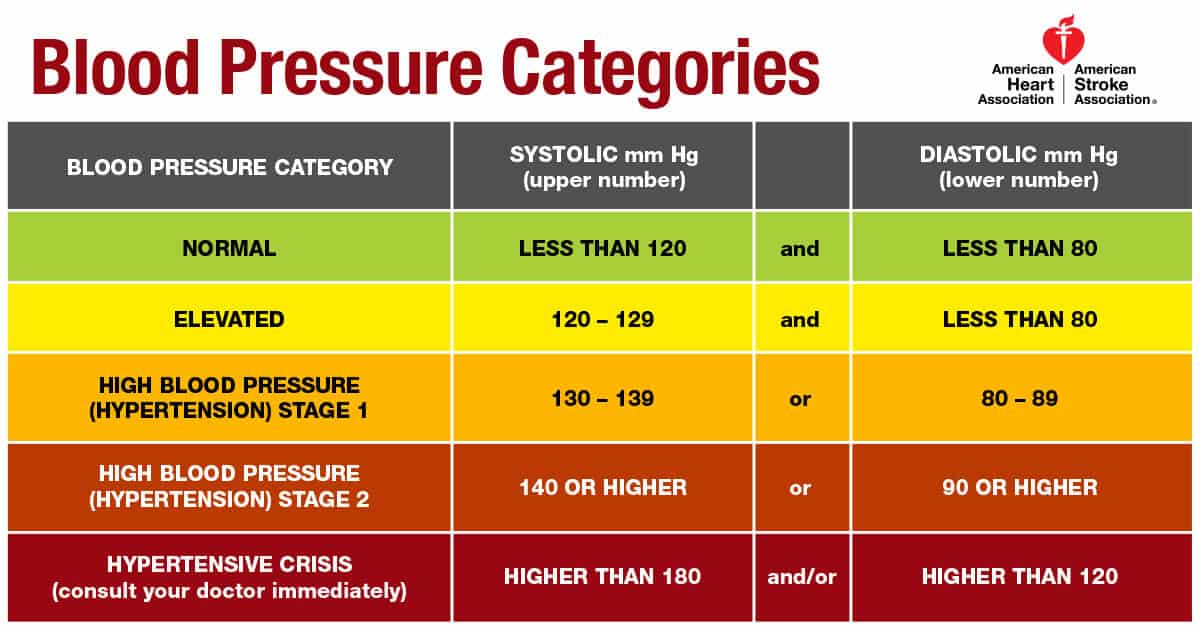New Hypertension Recommendations and Guidelines: PCNA Statement

credit: www.heart.org/hbp
The Preventive Cardiovascular Nurses Association (PCNA), along with the American Heart Association, the American College of Cardiology, and eight other organization, released updated hypertension recommendations and guidelines today that redefine high blood pressure, or hypertension.
The document, officially known as the Guidelines for the Prevention, Detection, Evaluation, and Management of Blood Pressure in Adults, changes the definition of high blood pressure to a systolic blood pressure reading of 130 mm Hg or higher or a diastolic reading of 80 mm Hg or higher. This is a considerable reduction from the previous definition of 140/90 mm Hg established by the 2003 Hypertension Guidelines. The updated hypertension recommendations and guidelines eliminate the term “pre-hypertension and outline four new blood pressure categories. The categories are:
- Normal – Less than 120/80 mmHg
- Elevated – 120 – 129 / <80 mmHg
- Stage 1 – 130 – 139 / 80-89 mmHg
- Stage 2 –At least 140/90 mmHg
- Hypertensive Crisis – Greater than 180/120 mmHg
The lower definition and new categories are designed to help people become aware of their risk earlier. Early intervention will in turn decrease complications associated with rising blood pressure levels. With the implementation of the new categories, it is estimated that the percentage of the population with hypertension will rise from 32 to 46%, but that there will be only a small increase in the number of individuals who require medication. The guidelines recommend that individuals with Elevated or Stage 1 hypertension that are otherwise healthy make lifestyle changes to reduce their blood pressure. Regular exercise, a low-sodium diet and weight loss can result in a significant drop in elevated blood pressure readings.
A panel of 21 scientists and health experts analyzed more than 900 scientifically-sound research studies and made new recommendations based on the findings that elevated blood pressure leads to an increased risk of heart disease, stroke, and other series health issues.
PCNA’s Immediate Past President Cheryl Dennison Himmelfarb, RN, ANP, PhD, FAHA, FPCNA, FAAN, is a co-author of the hypertension recommendations and guidelines and had this to say:
“There is a growing body of evidence that lower blood pressure is better for your health. Data show that risk for heart attack, stroke, and other consequences of high blood pressure begin at systolic blood pressure levels above 120mmHg. In fact, risk doubles at 130mmHg compared to levels below 120mmHg. The 2017 guidelines reflect this information to help people prevent and treat high blood pressure much sooner.”
Nurses and advanced practice nurses are ready to meet the challenge of implementing these new hypertension recommendations and guidelines. Nurses regularly apply behavior change principles and strategies, including shared decision-making when educating their patients to help reduce their primary and secondary cardiovascular risk. Patients benefit greatly from nurses being able to see them more frequently and for longer periods of time. Regular follow up helps to support patient’s efforts at lifestyle change, monitor effectiveness of treatments and medication adherence.
“PCNA is here to support nurses, with professional and patient education resources, as they implement these new guidelines and assist patients to make critical lifestyle changes,” said Jo-Ann Eastwood, PhD, CNS, ACNP-BC, FAHA, FAAN, PCNA President.
PCNA created a case-based program designed to develop the skills and knowledge necessary to partner with patients to make lifestyle changes that minimize their cardiovascular risk. The education program in Behavior Change awards a Mini- Certificate to health care providers who seek to enhance their skills in assisting patients in making critical lifestyle changes. Learn more about PCNA’s Behavior Change certificate here>
Read the full guidelines here>
Read the Executive Summary here>
Read the Systematic Review here>
